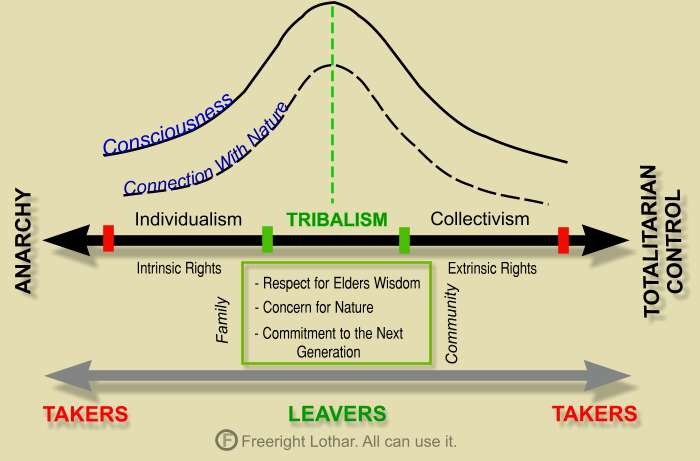Daniel Quinn is an observer of the failure of modern civilization and an advocate of a return to tribal values. He explores this in his book Beyond Civilization: Humanity Next Great Adventure.
Here are some thoughts that Quinn develops.
The readoption of tribal philosophies and values does not involve a return to living in caves and wearing animal skins for clothes. Those are stereotypes of Stone Age existence, not tribalism. True tribalism is the balance point between hedonistic individualism and anarchy on the one hand and totalitarian collectivism on the other. Daniel Quinn describes it as the natural form of organisation for humans. Just as the flock is the natural organisation for birds, the school is for fish and the hive is for bees, the tribe is the natural way for us to live and learn together.
The following diagram shows this positioning of tribalism between individualism and collectivism; between anarchy and totalitarian control.

True Tribalism Is A Societal Balance Point
Concerns with family fall more towards the left of centre while concerns for the community fall somewhat right of centre. Neither of these concerns survive the extremes of individualism or collectivism. Within the mid-range of the scale tribalism encompasses both concern for family and concern for the community. This does not imply that all forms of human organisation that incorporate values to do with family and community are necessarily tribal. But it is the case that true tribalism does hold and emphasise such values.
Tribal ways of living, whether they be in residual pockets of authentic aboriginal people or modern neo-tribes, represent a better social bargain than can be obtained at the extremes of individualism or collectivism. At the Anarchy end of the continuum nobody cares about family or community (nor the environment or much else for that matter) while at the Totalitarian Control end nobody is allowed to care about such things. In the centre, in a tribal form of society, one finds an accommodation of individual and group needs, mutual support frameworks, and genuine sharing of the burdens and joys of living.
Quinn points out that tribes are not perfect. They are, however, normally free of the extremes that make living impossibly difficult and even soul-shrinking. Here, somebody might point to the horrific massacres in Rwanda in 1994, in which some 500,000 Tutsi people were slaughtered by predominantly Hutu supporters of the government, as a 'failure' of tribalism. But the Rwandan massacres were not an example of tribalism in action, anymore than the firebombing of the German city of Dresden by the Allies, on Shrove Tuesday 1945, was an example of Christianity in action. Both atrocities were marked departures from the essential mores and teachings of tribal societies and of the Christian religion.
Tribal Models Worked For Thousands Of Years
The Australian aborigines were, prior to European settlement, people who lived in conditions of managed abundance. For sixty thousand years, far longer than the fleeting histories of socialism, communism and capitalism, aboriginal tribes existed in harmony with the land. No major wars were fought. Although there were skirmishes between tribes these were seldom serious or prolonged. The aboriginal people did not experience famine because they did not exceed the population levels that could sustain a hunter-gatherer existence. They had no government except their local tribal councils, and they paid no taxes. In order to survive, the aboriginal people of Australia had only to work the equivalent of three days per week, the rest of their time was for their leisure and storytelling. The concept of suicide was unknown to these original inhabitants of the Australian continent. They also enjoyed one advantage over modern Australians; tribal people had lifelong support and cradle to grave security within their tribe. In a technological sense tribal Australians were backward, but in terms of community and social support structures they were an advanced culture.
Read it all here.